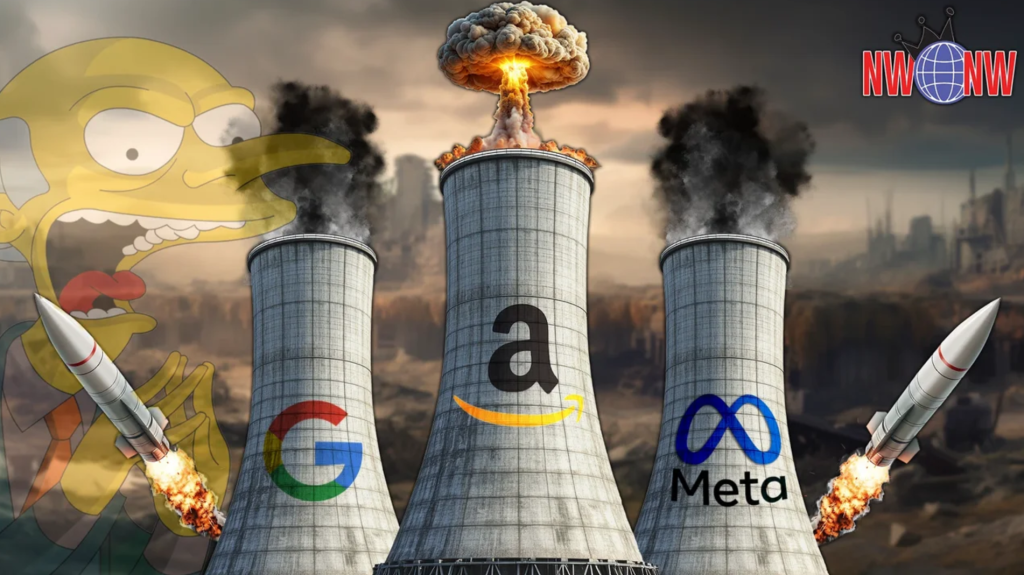Summary of Recent Developments in Open Source Intelligence News
The latest episode of the #NewWorldNextWeek video series, produced by The Corbett Report in collaboration with Media Monarchy, covers several critical developments in the sphere of technology, energy, and public trust. The foremost story is centered around significant investments made by major technology firms in nuclear energy, particularly Amazon and Google. Amazon plans to invest over $500 million in developing small modular reactors, while Google is set to utilize energy from similar reactors to power its burgeoning artificial intelligence data centers. This move towards nuclear energy underscores a broader trend, particularly as companies seek sustainable and efficient energy sources amidst an increasing demand for data processing capabilities. Both firms perceive nuclear energy as a solution that addresses energy needs while also aligning with climate action goals, even as critics highlight ongoing debates about the safety and environmental implications of nuclear power.
The topic of nuclear energy has additional complexities, particularly regarding public perception and ongoing developments in Japan. Recent trends suggest a cautious shift back to nuclear energy in Japan, driven by the need to reduce reliance on coal while meeting the energy demands of artificial intelligence technologies. Public concern remains over the safety of nuclear energy, especially in light of past incidents like the Fukushima disaster. The Tokyo Electric Power Company (TEPCO) has faced scrutiny and hiccups in debris removal operations at the affected Fukushima reactor, raising questions about the overall management and efficacy of safety surrounding existing nuclear facilities. These developments in Japan are coupled with a local political landscape where the electorate appears hesitant to fully endorse a nuclear revival, demonstrating the complexities that come with transitioning energy policies.
In a separate yet intriguing narrative, 23andMe, a prominent DNA testing service, is reportedly facing bankruptcy. This situation raises significant concerns about the future of the DNA samples collected from millions of consumers. As the potential dissolution of the company looms, questions about ownership rights and data privacy for these genetic samples come into sharp focus. This story intersects with broader fears regarding the possible exploitation of genetic data, creating a "DNA Control Grid" that raises ethical concerns reminiscent of Orwellian predictions about surveillance and control in society. The loss of 23andMe could lead to a significant gap in the accessibility and transparency of genetic data, further complicating the already fraught discourse around ownership and ethical treatment of personal genetic information.
Public trust in media continues to erode, marking another critical theme this week. Gallup’s recent findings show that Americans’ trust in media remains at an all-time low, underscoring a pressing need for transparency and accountability in reporting. This trend is troubling for democracy, as a well-informed public is foundational to healthy societal discourse. Additionally, an ongoing national emergency concerning terrorism continues to dictate the information narrative within the media sphere. These combined factors may lead to an increasingly polarized landscape where various forms of media compete for dwindling trust among the populace.
As discussions about the implications of technological advancements in energy and personal data continue, it’s essential to remain vigilant about the potential consequences of uncontrolled developments. The episode highlights a significant underlying issue: the intersection of technology, energy policy, and personal privacy rights. This landscape is rapidly evolving, suggesting that the decisions made today will have far-reaching impacts on society, individual freedoms, and environmental sustainability. Staying informed and critically evaluating the implications of these changes will be crucial as societal dynamics unfold in the coming years.
In conclusion, #NewWorldNextWeek emphasizes the urgency of addressing key issues related to nuclear energy, personal data ownership, and media trust. As major corporations pivot towards nuclear power and grapples with the implications of evolving technology, individuals must consider the broader implications of these changes on societal structure and environmental policy. More profound engagement in the public dialogue surrounding these topics will be essential to navigate the challenges posed by technological advancements, energy needs, and the overarching literature of privacy rights. Support initiatives aimed at independent media and conscientious discourse to create a more informed and engaged populace prepared to tackle these pressing global challenges.

